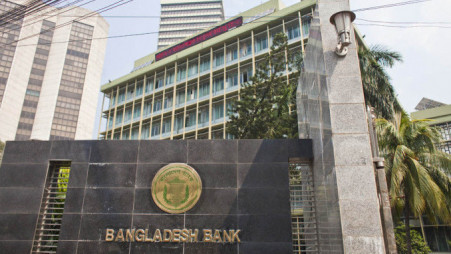Banks with bad loans exceeding 5% cannot sell insurance products: Cenbank
Banks must have a viable bancassurance business plan and review mechanism which must be approved by the board of directors concerned

Highlights
- Banks must maintain Bangladesh Bank's credit rating
- They must have a positive net profit over the last three years
- No customer can be forced to take the service
- Banks must credit the customers with the agreed-upon amount upon end of terms
Banks with net non-performing loans exceeding 5% and capital risk-weighted asset ratios falling below 12.5% will not be able to sell their insurance products, the Bangladesh Bank has said.
The central bank issued guidelines yesterday regarding bancassurance that outlined the qualifications for such insurance services, contracts, amendments, renewals, and cancellation procedures, as well as eligibility criteria for officers concerned.
The central bank mentioned that to enhance financial inclusion by insuring the uninsured people and boosting their commission-based income banks have been allowed to sell insurance services.
The banks can sell the service through their branches and digitally but no customer can be forced to take the service, the central bank said.
The banks must take prior approval from the central bank to sell insurance services and simultaneously, they will be required to obtain agent licences from the Insurance Development and Regulatory Authority for insurance development and regulation, it said.
Other conditions
The banks must maintain Bangladesh Bank's credit rating and CAMELS grade of minimum 2%. Additionally, they are required to have a positive net profit over the last three years.
Banks must have a viable bancassurance business plan and review mechanism which must be approved by the board of directors concerned. And the banks will require to have competent and suitable manpower to operate a dedicated bancassurance unit.
Common beneficial owners of the banks and insurance companies or related parties will not be eligible for engaging with bancassurance.
The banks will require Bangladesh Bank's approval for any amendment to the contracts with the insurance companies for sale of insurance services.
The boards of directors of the banks have to review the agreements signed with the insurance companies every three years.
If a bank terminates an agreement with an insurance company, it must fulfil the specified services to customers until the agreed-upon term expires.
Insurance beneficiaries will not incur any type of risk. When an insurance customer's specified term ends, the banks will credit the customer with the agreed-upon amount. Any complaints from the customer will be resolved jointly by the bank and the insurance company.
A senior official of Bangladesh Bank told The Business Standard that the financial sectors must be strengthened to develop Bangladesh into a middle-income country. "The insurance sector is very strong in most of the developed countries. The government has initiated bancassurance to spread the financial security of the people of the country. Now, in the beginning financially strong banks will be given the opportunity to sell this insurance service."
There will be changes in the policy from time to time, he added.
According to the latest update on the capital adequacy of banks under Basel-III in a Bangladesh Bank's report, 11 banks have non-performing net loans exceeding 5%. Additionally, 17 banks have lower capital than the prescribed amount. Therefore, these banks will not be able to sell bancassurance products according to the guidelines.
Bancassurance played a great role in increasing insurance penetration in many countries, including neighbouring India, and Bangladesh should not be an exception, BIA Vice President Nasir Uddin Ahmed told TBS.
There are over 11,200 bank branches across Bangladesh, and they can play a vital role in increasing the popularity of insurance in the country, he said.
The insurance penetration in Bangladesh is only 0.40 percent, when in neighbouring India the rate is 4 percent, according to the Swiss Re Institute's 2022 report.
"If the insurance companies were transparent and they could settle the claims of the customers, and the customers were happy with the companies, then there would be no question of needing bancassurance," said Professor Main Uddin of the Department of Banking and Insurance at Dhaka University.
The concept might be new in Bangladesh, but bancassurance appears to have begun in France in the 1970s, according to investopedia.com. Since then, it has been embraced by most countries, particularly those in the Asia-Pacific region.


 Keep updated, follow The Business Standard's Google news channel
Keep updated, follow The Business Standard's Google news channel















